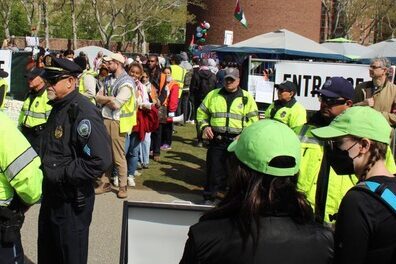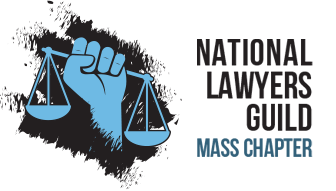Northeastern University – Reflection 1
In the early morning hours of April 27, 2024, the sun rose over Centennial Common at Northeastern University, throwing early morning light onto a scene that harkens back to the fateful hours leading up to the Kent State massacre over fifty years ago. Northeastern students had occupied Centennial Common with tents, chairs, plastic tables, and tarp, stating that they would refuse to leave until the administration agreed to three demands: disclose its financial ties to Israel, divest from those ties, and denounce the ongoing genocide in Palestine.
On this particular morning, Legal Observers watched three different police departments, replete with riot gear, zip ties, and covered-up badges, swarm onto Northeastern’s campus and face down a group of over one hundred students–some in sweatpants and Crocs and rubbing the few hours of sleep they’d managed to get out of their eyes. Between the hours of 11:00PM on April 26 to 7:00AM on April 27, Legal Observers observed a moving company hired by Northeastern to sweep the camp after the raid, dozens of police lining up inside academic buildings, and so many police cars and vans (many unmarked) surrounding the Common that we had trouble counting.
In the face of an impending raid, the students linked arms and surrounded their encampment on the Common, steadfastly protecting their tents, each other, and the clarity of their demands. We heard the ever-present chant: “Disclose! Divest! We will not stop, we will not rest!” These students braved the cold nights, suspensions from school, constant police presence and threats from both the police and Northeastern administration, and finally, brutal arrests. They never lost sight of their vision: that they would occupy Centennial Common until Northeastern agreed to their demands, or at the very least, engaged in good-faith negotiations. However, students’ attempts at negotiations had failed. Instead, the Northeastern administration sent in the police to arrest its own students.
When arrests began, Legal Observers were removed from the scene by the police and forced to stand behind barricades. We walked with our hands up to the street, hearing screams of anger from supporters on the street. We witnessed a protester collapse and watched as the police ignored a clearly marked medic pleading for entry to the Common. Later, we saw that same protester being led into a Northeastern building, Shillman Hall, with their hands zip-tied behind their back. When the community standing outside the Shillman Hall saw them with their hands behind their back, they chanted “let them go.” In response, the police were quick to pull down the window blinds of the room. The student was not observed leaving the building until multiple hours later.
Everyone in the camp, students and faculty alike, was arrested. Many students were taken into Shillman Hall and held there for hours before being transported to jails. The Legal Observers were approached by multiple faculty members who told us they were denied access to the building while trying to protect their students. Other students were commanded to sit on the curb surrounding the camp or taken directly to the police cars. Later, we were also told that inside the building, students were given the option to identify themselves and face academic sanctions only, or be arrested. Almost all of them refused to identify themselves.
After the raid, the administration cited antisemitic chants as a justification for the raid, chants that were immediately shown to have been uttered by a Zionist agitator and not repeated by a single student inside the camp. Legal Observers on the scene corroborated this, witnessing multiple agitators raising Israeli flags at the perimeter of the camp, yelling at protesters, and calling a Black protester a terrorist. Northeastern also attempted to justify its decision with a debunked claim that “professional organizers” infiltrated the camp as another reason to shut it down. Despite multiple calls and emails from outraged students, alumni, and community members to Vice President of Communications Renata Nyul (who had made those lies about students public), the NEU administration has only doubled down. It’s worth mentioning that in the past, Northeastern had not only tolerated but celebrated protest encampment calling for fossil fuel divestment, in 2016. Students occupied Centennial Common with tents for 13 days with no arrests.
There is a stark difference in how NU has and continue to respond to Pro-Palestinian protest on campus. Northeastern administration and the riot police broke into a peaceful camp that did not violate any laws or school policies. For the two days the camp was standing, the Legal Observers observed a strong community where students were praying together, chanting, singing, sharing meals, hosting teach-ins, and holding a Passover seder to honor their Jewish comrades inside the camp. Students constantly came up to the Legal Observers, asking if we needed water, if we’d eaten enough, and thanking us for being there. These are not the actions of violent anti-semites that various bad actors are trying so desperately to convince the world that these students are. This is a community, a principled, clear-eyed community that dreams of and fights for a free Palestine. NU treatment of Palestinian advocacy on campus continues to stand alone as the most sanctioned advocacy. For instance, students who posted flyers around campus, a very common practice for students on campus, honoring the martyrs of the Gaza genocide faced unprecedented disciplinary sanctions.

These students were, and still are, unwavering in their stance and wholly unafraid to risk everything. And throughout the days we observed at their camp, they constantly reminded us and everyone else there precisely who gives them their strength, who they learn from, and who they fight for: Palestine. The genocide in Gaza has surpassed 120 days, and the number of those murdered by the Zionist entity is well past 40,000. Students are speaking out against a genocide whose blood laces all of our tax-paying fingers. As long as the Northeastern continues to invest in the annihilation of the Palestinians people, students will continue to advocate. They refused to be silenced into complicity.
Northeastern University – Reflection 2
The afternoon of Friday, April 26th almost felt like a normal, early spring day on Centennial Common at Northeastern University, so long as you ignored the state troopers.
Students sat in colorful Adirondack chairs, talking, laughing, and finishing final papers while the late spring sun slowly warmed the air. Together, they painted cardboard signs in black, green, and red asserting their demands for divestment and their solidarity with the people of Palestine. The scene was a stark contrast from the chaos the day before, and from the ultimate end of the encampment that nobody knew — though many expected — was right around the corner.
On Thursday, tensions built throughout the day and peaked when officers in riot gear encircled the encampment around 2:30pm. Students linked arms and chanted throughout the 20-minute stand-off, while press, supporters, counter-protestors, and legal observers looked on. The relief was palpable when police dispersed, despite organizer’s suspicions that said relief would be short lived.
By late Friday afternoon, everyone had reasons to lose energy, to lose hope. Students had spent the unseasonably cold night in tents, huddled under emergency blankets and sleeping in shifts. Faculty supporters had spent two days liaising between demonstrators and administration. Legal observers had set up overnight shifts; some had stayed up overnight at the encampment, then traded off shifts at 6am and headed straight to work.
But none of this was apparent looking over the encampment on Friday. Instead, students were buoyed by their success in surviving the night, and by their dedication for the Palestinian cause. Their energy, their passion, and their joyful resistance was infectious. Students played music, set up a free library of zines, shared food, held a Seder, lead teach-ins to educate people on the genocide in Palestine and discuss their divestment demands, and started a dabke circle. Banners proudly proclaimed Gaza, we see you, Rafah, we see you, and each tent sported a sign naming it in honor of a Palestinian city. Faculty supporters milled around the edges, talking with students and keeping a watchful eye. Street medics passed out sunscreen and bottled water. Supporting students gathered around the edges of the commons, sporting keffiyehs and cheering on their friends inside the encampment. One of my fellow legal observers passed out chocolate covered espresso beans (which quickly became the LO snack of choice at encampments across the city).
When I think back on these last few weeks, those calm hours on Friday are not the first thing that come to my mind. I recall many moments of chaos and fear: bolting awake in the pre-dawn hours of Saturday morning and seeing the message on signal anyone who can get here, get here now; running around the encampment trying to get a final headcount: being removed from the commons by police and forced to observe from outside police barricades; tallying arrests as protestors were zip-tied and walked out of view. I think of all the photos and videos I have seen of the Palestinian genocide, of the death and destruction people are fighting so hard to end.
I choose to highlight that sunny Friday afternoon first, because it is dangerous to give into despair, and because the joy we find in community is the foundation of any resistance. Legal observers have stretched ourselves thin working the encampments, staying late into the night or waking in the early hours of the morning, standing watch over arrests and brutality. But every time another observer asks me if I’m alright, every time I watch someone make sure their fellow demonstrators are safe and cared for, every time students link arms with their community and demand a free Palestine, I am reminded of why we need to keep going.
The last standing encampment at Harvard disassembled voluntarily this week, after discussions with administration. Most universities have not met students’ divestment demands, and the people of Palestine are in more danger than ever as threats on Rafah loom.



